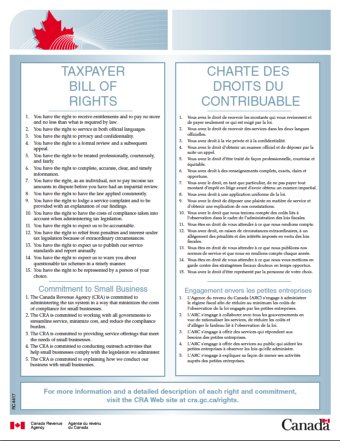
Voluntary Disclosure of Unfiled Taxes
by L. Kenway BComm CPB Retired
Quick Links
- Proposed new rules effective March 2018
- Making the Disclosure
- Non-Compliance Penalties
- Ineligibility
- Protecting Yourself Against 3rd Party Penalties
In this chat, I'm going to touch on my limited knowledge of CRA's Voluntary Disclosure Program. So warm up your tea cup and join me for the next five minutes to understand your options.
Do you have years where you (or your clients) have failed to file a return ... or perhaps the tax return filed wasn't an accurate tax return because of unreported income ... or understated sales ... or overstated expenses?
In Canada, our system is a self assessing system and relies on voluntary compliance.
The purpose of the voluntary disclosure program is to encourage individuals to self-correct incomplete or inaccurate information, and past omissions; while granting relief to those who satisfy all the conditions through waiving interest, penalties, publicity, and prosecution.
Tax Audits - Four Part Series
click on image below to go to chat
Chat 1
Tax Audits The Process |
Chat 2
Receiving a Tax Notice |
Chat 3
Taxpayer Rights |
Chat 4
Voluntary Disclosure |
Proposed New Rules Effective March 2018
Here are some of the proposed administrative changes to the voluntary disclosure program guidelines for income tax and source deductions. GST/HST disclosures will have separate policies.
- Must file using Form RC199
- Rules around when/if a second application can be filed.
- Must generally disclose the name of the advisor when making the application.
- Paying estimated taxes at the time the application is made.
- Eliminating the option of not providing a name when filing the application.
- CRA can cancel the application if the applicant filed incomplete information due to misrepresentation, neglect, willful default or fraud.
- Restricting who can make an application under the program; exclusions/no relief for:
(a) corporations with gross revenue over $250 million in two of the last five years;
(b) transfer pricing matters;
(c) proceeds of crime disclosures;
(d) person in receivership or bankrupt; and
(e) applications that require agreement with a competent authority under a tax treaty provision (for example S-corporation agreements). - Moves away from the "one size fits all' program. There will be two tracks:
(a) General Program for inadvertent and minor non-compliance with no change in current penalty relief policy and a 50% interest relief may be granted while the right to file a notice of objection is removed; and
(b) Limited Program where relief is curtailed for major cases of unreported income including sophisticated taxpayers will not be assessed gross negligence penalty and not subject to criminal prosecution; all other penalties assessed will not be forgiven as well as no interest relief. They also waive their objection rights pertaining to taxes assessed.
Some GST/HST disclosure guidelines will be different from income tax and source deduction guidelines:
- Moves away from the "one size fits all' program. There will be three tracks:
(a) General Program for disclosing non-compliance or errors and must include six years before application filing date with possible 50% interest relief and 100% penalty relief;
(b) Limited Program for major non-compliance (must include all relevant years before application filing date with no interest or penalty relief) which includes collecting but not remitting GST/HST, participating in the underground economy, gross negligence, multiple years of non-compliance; and
(c) GST/HST Wash Transactions may receive full interest and penalty relief, and must include four years before application filing date. A wash transaction refers to a supplier that failed to charge GST/HST from a registrant that is entitled to claim ITCs or where ITCS are wrongly claimed between closely related parties.
Sources: CRA IC00-1R6; June 21, 2017 Issue 26 EY Tax Alert-Canada; pwc Tax Insights issue 2017-28; June 21, 2017 Issue 27 EY Tax Alert-Canada
Making The Voluntary Disclosure
The request must be in writing by letter ... or use CRA Form RC199. The voluntary disclosure date is when the CRA has received the request OR the date the taxpayer (or their representative) signs the client agreement form.
You must meet four conditions to qualify for the program. The four conditions are:
You must pre-plan your disclosure because you only have a 90 day deadline to provide CRA with the type of returns involved, type of information returns, type of omission, primary business activity along with an explanation of how you feel you have met the four validity conditions that must be met.
There are two options when applying - with a name disclosure OR as a no-name disclosure ... each has different information requirements.
There is a procedure to follow to make a voluntary disclosure ... and it is advisable to follow it and not cut corners.
The Bookkeeper's Tip
A Good Bookkeeping Practice
Protect Yourself Against Third Party Civil Penalties
If you suspect that criminal proceedings may be possible if the voluntary disclosure program was not used ...
... it is usually recommended that you refer your client to a tax lawyer (one who specializes in this field) before proceeding because ...
... a lawyer has solicitor - client privileges that an accountant or bookkeeper does not have.
The lawyer can then engage the services of an accountant or bookkeeper of the client's choice to act as their agent. You should then not be subject to the possibility of third party civil penalties.
The first submission must be done correctly in the event the request is denied.
E&Y's Tax Intelligence Newsletter dated September 2012 covers the topic of client privilege in the article, Understanding privilege in a tax context. It is worth reading!
The article explains that privilege is different than confidential communications with professional advisors. It goes on to explain how you can protect privilege over communications with professional advisors other than your lawyer.
Non-Compliance Penalties
Penalties apply for failure to comply with the Income Tax Act (ITA). Technically, it is a criminal offense not to file a tax return for any reason ... but CRA rarely prosecute solely for not filing ... but it could happen.
My references say penalties include:
- gross negligence civil penalties (knowingly under reporting tax income) ... the greater of
- $100; and
- 50% of tax that was avoided
- A corresponding provincial penalty may also be applied
- repeated failure to file income
- 10% of income not reported ... and a corresponding provincial penalty may be applied
- failure to file criminal charges (failed to file when required ... OR tax evasion) ...
- A minimum $1000 fine plus possibly 12 months in jail; OR
- A penalty between 50% and 200% of the tax evaded plus possibly 5 years jail time respectively.
- failure to file civil penalties ... failure to report income civil penalties ...
- The penalty is 5% of the unpaid tax at the date on which the return was due to be filed AND 1% of the unpaid tax for each complete month the return was late ... for up to 12 months ... that's a minimum of 17% per year (before compounded daily interest).
- Repeated failures to file ... after a demand for return was served ... doubles the penalties.
Voluntary Disclosure Ineligibility
If CRA has already made a demand request, you are no longer eligible for the program.
So ... first important rule in doing business in Canada ... each year pay CRA by the filing deadline ... estimating the tax payable if necessary.
My favorite tax site has a great income tax calculator you could use to this do estimate.
In closing, some the consequences of unreported income that may be of interest to you are:
- Interest and penalty assessments.
- Possible charges of tax evasion and/or imprisonment along with public posting of charges on CRA website.
- Loss of personal property as CRA forces sale of home and other personal assets. CRA liens are paid out first (i.e. before your mortgage).
The Canadian Bar Association has an introduction to the Federal Voluntary Disclosures Program titled Coming Clean to the CRA.

It's been great chatting with you.
Your Tutor
Bookkeeping Essentials › Understanding Tax Audits in Canada › Voluntary Disclosure



